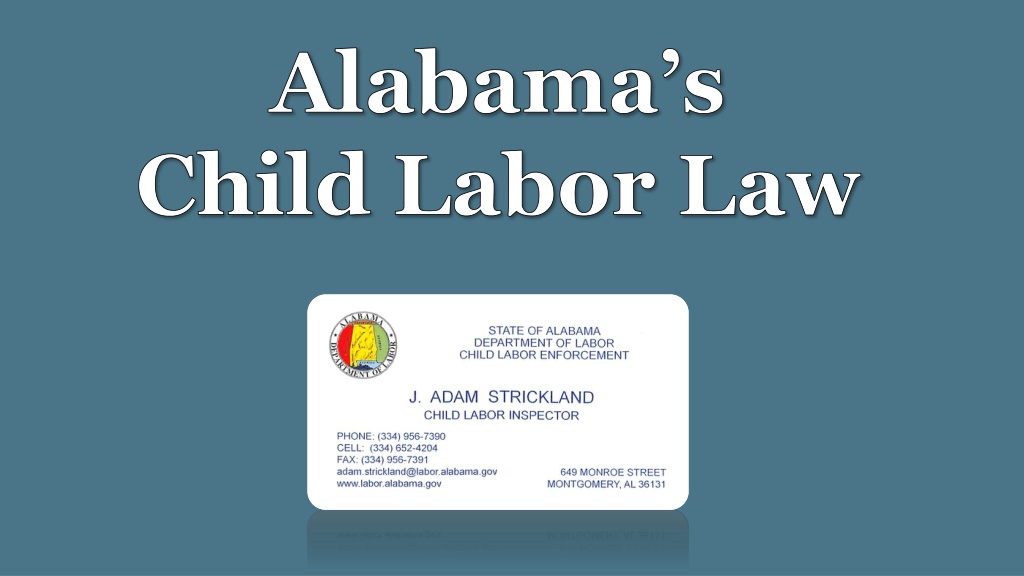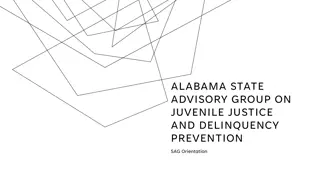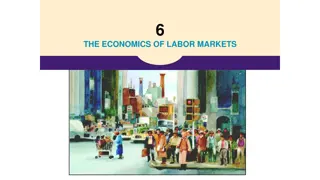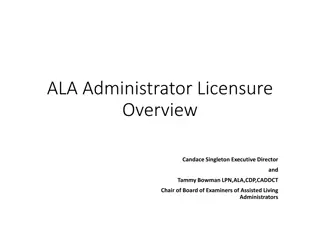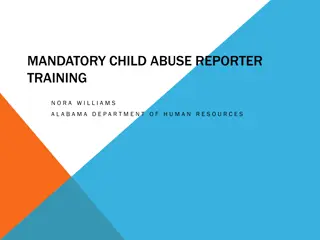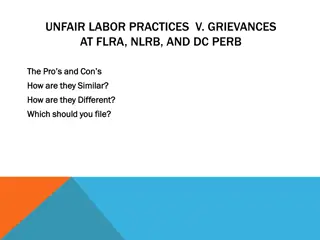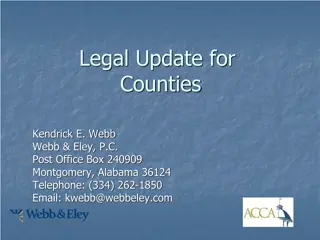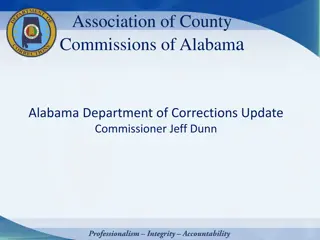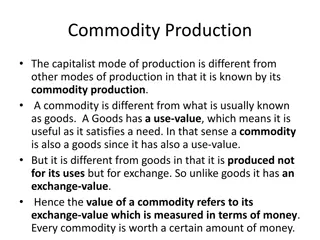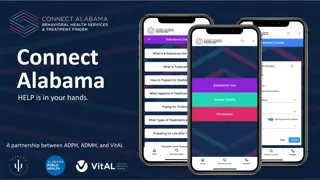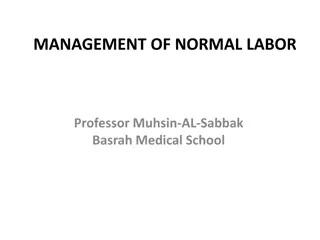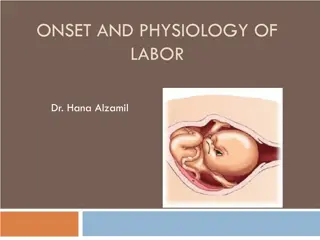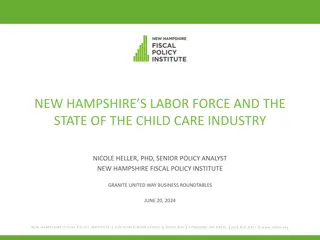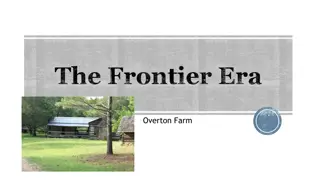Alabama Child Labor Law Guidelines
Alabama's Child Labor Law establishes regulations concerning the minimum age to work, exemptions for certain types of work like lemonade stands and agriculture, requirements for Child Labor Certificates, eligibility criteria for minors aged 14 and 15, the necessity of displaying labor law posters, record-keeping obligations for employers, and work time restrictions based on age and school session. The law aims to protect the rights and well-being of young workers in the state.
Download Presentation

Please find below an Image/Link to download the presentation.
The content on the website is provided AS IS for your information and personal use only. It may not be sold, licensed, or shared on other websites without obtaining consent from the author.If you encounter any issues during the download, it is possible that the publisher has removed the file from their server.
You are allowed to download the files provided on this website for personal or commercial use, subject to the condition that they are used lawfully. All files are the property of their respective owners.
The content on the website is provided AS IS for your information and personal use only. It may not be sold, licensed, or shared on other websites without obtaining consent from the author.
E N D
Presentation Transcript
Alabamas Child Labor Law
MINIMUM AGE TO WORK (Age 14) WE DO NOT SHUT DOWN LEMONADE STANDS! (Work that a minor performs independently is not covered by Alabama Child Labor Law) Agriculture is exempt from Alabama Child Labor Law. (Federal Law applies in some instances) Parents may employ their children of any age in non-hazardous occupations provided they are the sole owner(s) of the business and the child is exclusively under their supervision.
CHILD LABOR CERTIFICATES Employers who wish to employ persons under the age of 18 years of age must obtain and post the appropriate Child Labor Certificate(s) at each location where minors are employed.
ELIGIBILITY TO WORK (Ages 14 and 15) Minors under the age of 16 must be enrolled in school, in regular attendance, and making satisfactory progress in order to be employed.
POSTER A Child Labor Law poster must be on display in every location employing persons aged 18 and younger. These posters are FREE and available for download at labor.alabama.gov.
KEEPING RECORDS Employers must keep on premises records of the following: Name Address Telephone number Date of birth Date of hire School of attendance Proof of Age Time records
WORK TIME RESTRICTIONS (When school is in session) Ages 14 and 15 Not before 7:00 a.m. or after 7:00 p.m. ANY DAY OF THE WEEK Not during hours when school is in session (8:00 a.m. - 3:00 p.m.) No more than 3 hours on ANY SCHOOL DAY No more than 8 hours on non-school days No more than 6 days per week No more than 18 hours per week Ages 16-18 Minors 16, 17, and 18 years of age, who are enrolled in public or private school, shall not work between 10:00 p.m. and 5:00 a.m. on any night preceding a school day.
WORK TIME RESTRICTIONS (During summer months) Ages 14 and 15 Not before 7:00 a.m. or after 9:00 p.m. ANY DAY OF THE WEEK No more than 8 hours per day No more than 40 hours per week No more than 6 days per week Ages 16-18 There are no hour restrictions if the teen does not have school the next day.
EXEMPTIONS The superintendent (or headmaster of a private school) may issue a Certificate of Exemption to allow teens aged 16-18 to work beyond the hour restrictions.
BREAKS A 30-minute break is required for any employee aged 14 and 15 working for more than five hours continuously. All required breaks must be documented in the employee s time records. No breaks are required for employees aged 16 and older.
7 Deaths in 7 Years ALABAMA 2000 2007 1. A 16-year-old male laborer was killed installing roof trusses at Stillman College. After losing his balance, he fell 25 feet to the ground and died at the scene. 2. A 14-year-old male roofer s helper fell through a skylight to the concrete floor below. He died the next day from severe head injury. It was his first day on the job.
3. A 15-year-old male was killed operating a 16-ton roller/compactor on a road crew. He slipped while climbing on the machine and accidentally grabbed a lever. The roller started moving and he fell between the cab and the roller. He was crushed and killed instantly. 4. A 17-year-old male was crushed to death at a chicken plant when large cages became jammed on a conveyor system. He had been working at this location since he was 15, using false papers.
5. A 17-year-old female volunteer firefighter was killed when the tanker truck she was riding in flipped off a bridge. She was not wearing a seatbelt. 6. A 17-year-old male was killed when he lost control of the dump truck he was driving and it flipped. It was his first day on the job. 7. An 18-year-old male high school student was ordered to work a night shift. He fell asleep while driving from work to school and was killed.
PROHIBITED OCCUPATIONS ADOL shall have the right to enter, without prior notice or warrant, any business for the purpose of inspection. ADOL may declare a place or occupation dangerous to life or limb or injurious to the health or morals of persons under 18 years of age. The presence of any person under 18 years of age in any restricted establishment or occupation shall be evidence of their employment. See AL 25-8-33 to 25-8-35 and 25-8-43 for a detailed list of prohibited occupations.
PROHIBITED OCCUPATIONS (Ages 14 and 15)
In about, or in connection with any manufacturing or mechanical establishment, cannery, mill, workshop, warehouse, or machine shop. In the manufacture or packing of paints, colors, or white or red lead. In occupations causing dust in injurious quantities. In soldering, brazing, heat treating, or welding. In the building trades, except that persons 14 or 15 years of age who are members of the immediate family of the contractor may be employed in trades involving nonhazardous duties or occupations. Repairing, painting, or cleaning buildings or structures while working at the top of ladders, lifts, or scaffolds exceeding a height of six feet. In connection with a junk or scrap metal yard. Assorting, manufacturing, or packing tobacco. Operating any automobile, truck, or motor vehicle, or flagging or directing traffic. In airport hangars or landing strips or taxi and maintenance aprons. In connection with any lumberyard. Operating or assisting in operating any sandpaper or wood polishing machinery, any washing, grinding, or mixing machinery, or commercial laundry equipment. Operating or assisting in operating any machines used in picking wool, cotton, hair, or any other material. In any work in or about a rolling mill, machine shop, or manufacturing establishment which is hazardous or dangerous to health, limb, or life. In proximity to any hazardous or unguarded gearing. Upon any vessel or boat engaged in navigation or commerce within the jurisdiction of this state. See AL 25-8-33 to 25-8-35 and 25-8-43 for a detailed list of prohibited occupations.
PROHIBITED OCCUPATIONS (Under 18)
In or about or in connection with any mine, coke breaker, coke oven, or quarry in any capacity. In wrecking, demolition, and shipbreaking. In any tunnel or excavation with a depth of four feet or more. In any roofing, scaffolding, or sandblasting operations. Operating or driving any truck or heavy equipment over three tons gross weight. In logging or around any sawmill, lath mill, shingle, or cooperage-stock mill. Operating any power-driven woodworking, bakery, or paper products machinery. Upon any steam, electric, diesel, hydraulic, or other railroad. As firefighters. Operating any stamping machines used in sheet metal or tin ware, or in paper or leather manufacturing, or washer or nut factories. In or around any steam boiler or rolling mill machinery. Operating any power-driven metal forming, cutting, straightening, drawing, punching, or shearing machines. Operating or assisting in operating any elevators, open freight elevators, cranes, derricks, or other power-driven hoisting apparatus, with the exception of an unattended automatic passenger elevator.
Operating any paper cutting, stapling, corrugating, or punching machines. Assembling, adjusting, cleaning, oiling, or servicing machinery in motion. Operating any circular saws, band saws, or guillotine shears. In or around any distillery where alcoholic beverages are manufactured, bottled, wrapped, or packed. In the manufacture, storage, or transportation of explosive components. In the manufacturing of brick, tile, or similar products. In the manufacture or transportation of dangerous or toxic chemicals or compounds. In, about, or in connection with, poisonous dyes, dangerous or poisonous gases, compositions of lye in dangerous quantities, dangerous or poisonous acids, or pesticides. In any activity involving exposure to radioactive substances or ionizing radiation. Around asbestos or any other cancer-causing agents. Operating or assisting in operating any job, cylinder, or offset printing presses. In any activity involving slaughtering, butchering, and meat cutting. See AL 25-8-33 to 25-8-35 and 25-8-43 for a detailed list of prohibited occupations.
ALCOHOL Employees must be 21 to serve alcoholic beverages for consumption on premises (19 if licensee is certified through the Responsible Vendor Program). Minors 16 and older may be employed in such establishments as busboys, janitors, dishwashers, cooks, hostesses, or seaters. Minors ages 14 and 15 SHALL NOT work in any establishment that serves alcohol for consumption on premises. Members of the immediate family of the owner or operator who are ages 14 or 15 may be employed in such establishments provided they do not serve alcohol.
ADULT ESTABLISHMENTS No person age 18 or under shall be employed in or perform in any adult establishment. UNDER 18
EXEMPTIONS FOR PROHIBITED OCCUPATIONS ALABAMA LAW: Certain prohibited occupations shall not apply to any registered apprenticeship or to the employment procured and supervised through the Alabama Department of Education and approved by the Alabama Department of Labor. FEDERAL LAW: Some hazardous occupations orders contain exemptions for apprentices aged 16 and 17 and student learners provided they are employed under certain conditions.
EXEMPTIONS FOR APPRENTICES The apprentice is employed in a craft recognized as an apprenticeable trade; The work of the apprentice in the occupations declared particularly hazardous is incidental to his training; Such work is intermittent and for short periods of time and is under the direct and close supervision of a journeyman as a necessary part of such apprentice training; The apprentice is registered by the Bureau of Apprenticeship and Training of the United States Department of Labor as employed in accordance with the standards established by that bureau.
EXEMPTIONS FOR STUDENT LEARNERS The student learner is enrolled in a course of study and training in a cooperative vocational training program under a recognized state or local educational authority or in a course of study in a substantially similar program conducted by a private school and; Such student learner is employed under a written agreement which provides: (a) That the work of the student learner in the occupations declared particularly hazardous shall be incidental to his training; (b) That such work shall be intermittent and for short periods of time, and under the direct and close supervision of a qualified and experienced person; (c) That safety instructions shall be given by the school and correlated by the employer with on-the-job training; and (d) That a schedule of organized and progressive work processes to be performed on the job shall have been prepared.
The Child Labor Division of ADOL is available, at no cost, to help businesses comply with the Alabama Child Labor Law and to facilitate the employment of minors ages 14-18. ADDITIONAL INFORMATION CAN BE FOUND AT: https://labor.alabama.gov/uc/ChildLabor/child-labor.aspx https://www.dol.gov/whd/childlabor.htm
